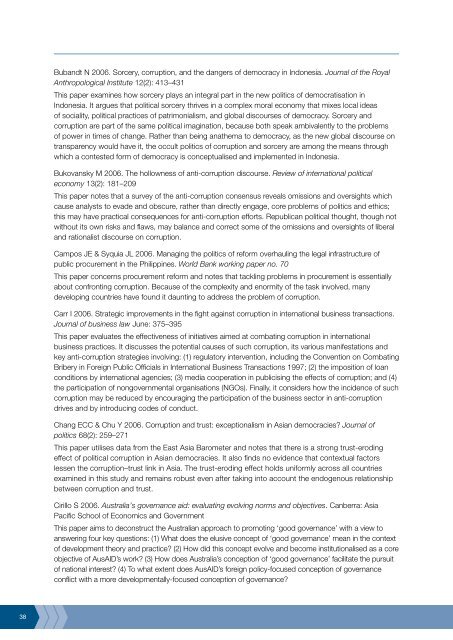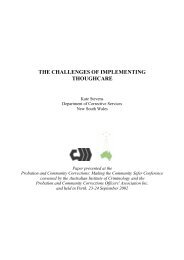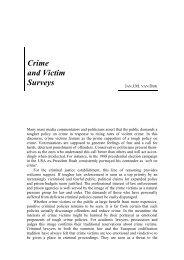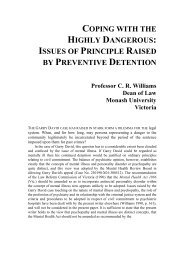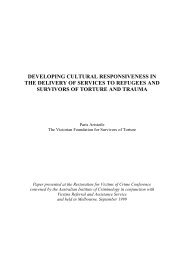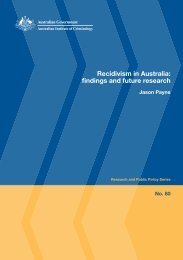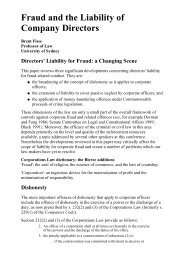Review of anti-corruption strategies Rob McCusker - Australian ...
Review of anti-corruption strategies Rob McCusker - Australian ...
Review of anti-corruption strategies Rob McCusker - Australian ...
Create successful ePaper yourself
Turn your PDF publications into a flip-book with our unique Google optimized e-Paper software.
Bubandt N 2006. Sorcery, <strong>corruption</strong>, and the dangers <strong>of</strong> democracy in Indonesia. Journal <strong>of</strong> the Royal<br />
Anthropological Institute 12(2): 413–431<br />
This paper examines how sorcery plays an integral part in the new politics <strong>of</strong> democratisation in<br />
Indonesia. It argues that political sorcery thrives in a complex moral economy that mixes local ideas<br />
<strong>of</strong> sociality, political practices <strong>of</strong> patrimonialism, and global discourses <strong>of</strong> democracy. Sorcery and<br />
<strong>corruption</strong> are part <strong>of</strong> the same political imagination, because both speak ambivalently to the problems<br />
<strong>of</strong> power in times <strong>of</strong> change. Rather than being anathema to democracy, as the new global discourse on<br />
transparency would have it, the occult politics <strong>of</strong> <strong>corruption</strong> and sorcery are among the means through<br />
which a contested form <strong>of</strong> democracy is conceptualised and implemented in Indonesia.<br />
Bukovansky M 2006. The hollowness <strong>of</strong> <strong>anti</strong>-<strong>corruption</strong> discourse. <strong>Review</strong> <strong>of</strong> international political<br />
economy 13(2): 181–209<br />
This paper notes that a survey <strong>of</strong> the <strong>anti</strong>-<strong>corruption</strong> consensus reveals omissions and oversights which<br />
cause analysts to evade and obscure, rather than directly engage, core problems <strong>of</strong> politics and ethics;<br />
this may have practical consequences for <strong>anti</strong>-<strong>corruption</strong> efforts. Republican political thought, though not<br />
without its own risks and flaws, may balance and correct some <strong>of</strong> the omissions and oversights <strong>of</strong> liberal<br />
and rationalist discourse on <strong>corruption</strong>.<br />
Campos JE & Syquia JL 2006. Managing the politics <strong>of</strong> reform overhauling the legal infrastructure <strong>of</strong><br />
public procurement in the Philippines. World Bank working paper no. 70<br />
This paper concerns procurement reform and notes that tackling problems in procurement is essentially<br />
about confronting <strong>corruption</strong>. Because <strong>of</strong> the complexity and enormity <strong>of</strong> the task involved, many<br />
developing countries have found it daunting to address the problem <strong>of</strong> <strong>corruption</strong>.<br />
Carr I 2006. Strategic improvements in the fight against <strong>corruption</strong> in international business transactions.<br />
Journal <strong>of</strong> business law June: 375–395<br />
This paper evaluates the effectiveness <strong>of</strong> initiatives aimed at combating <strong>corruption</strong> in international<br />
business practices. It discusses the potential causes <strong>of</strong> such <strong>corruption</strong>, its various manifestations and<br />
key <strong>anti</strong>-<strong>corruption</strong> <strong>strategies</strong> involving: (1) regulatory intervention, including the Convention on Combating<br />
Bribery in Foreign Public Officials in International Business Transactions 1997; (2) the imposition <strong>of</strong> loan<br />
conditions by international agencies; (3) media cooperation in publicising the effects <strong>of</strong> <strong>corruption</strong>; and (4)<br />
the participation <strong>of</strong> nongovernmental organisations (NGOs). Finally, it considers how the incidence <strong>of</strong> such<br />
<strong>corruption</strong> may be reduced by encouraging the participation <strong>of</strong> the business sector in <strong>anti</strong>-<strong>corruption</strong><br />
drives and by introducing codes <strong>of</strong> conduct.<br />
Chang ECC & Chu Y 2006. Corruption and trust: exceptionalism in Asian democracies? Journal <strong>of</strong><br />
politics 68(2): 259–271<br />
This paper utilises data from the East Asia Barometer and notes that there is a strong trust-eroding<br />
effect <strong>of</strong> political <strong>corruption</strong> in Asian democracies. It also finds no evidence that contextual factors<br />
lessen the <strong>corruption</strong>–trust link in Asia. The trust-eroding effect holds uniformly across all countries<br />
examined in this study and remains robust even after taking into account the endogenous relationship<br />
between <strong>corruption</strong> and trust.<br />
Cirillo S 2006. Australia’s governance aid: evaluating evolving norms and objectives. Canberra: Asia<br />
Pacific School <strong>of</strong> Economics and Government<br />
This paper aims to deconstruct the <strong>Australian</strong> approach to promoting ‘good governance’ with a view to<br />
answering four key questions: (1) What does the elusive concept <strong>of</strong> ‘good governance’ mean in the context<br />
<strong>of</strong> development theory and practice? (2) How did this concept evolve and become institutionalised as a core<br />
objective <strong>of</strong> AusAID’s work? (3) How does Australia’s conception <strong>of</strong> ‘good governance’ facilitate the pursuit<br />
<strong>of</strong> national interest? (4) To what extent does AusAID’s foreign policy-focused conception <strong>of</strong> governance<br />
conflict with a more developmentally-focused conception <strong>of</strong> governance?


